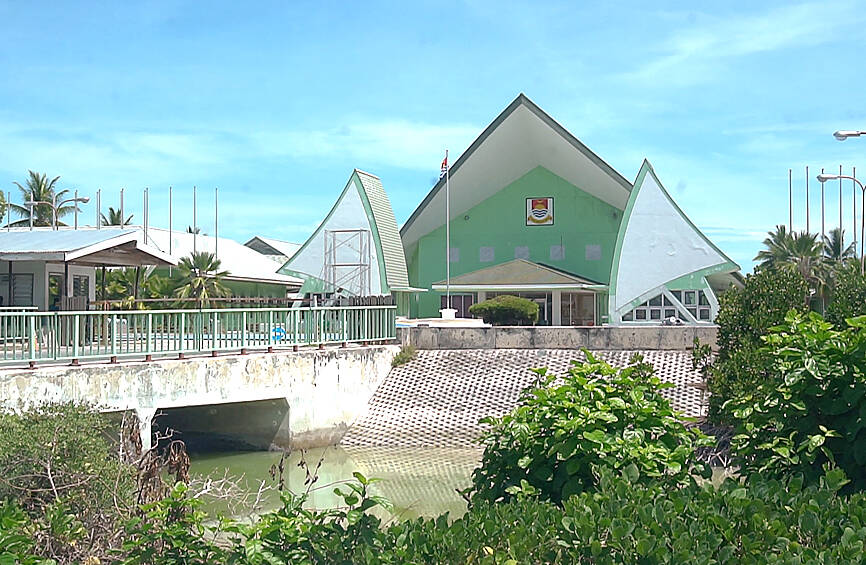The government of Kiribati is suspending all diplomatic visits to the tiny Pacific island nation until next year and has canceled some already planned, because it is in the middle of an election process that could run for several more months, an official said on Thursday.
The official in the Kiribati Ministry of Foreign Affairs told reporters that a message announcing the pause in diplomatic trips was sent earlier this week to countries that have diplomatic relations with Kiribati — a low-lying atoll of 120,000 people.
It follows escalating friction between Kiribati and Western nations — particularly Australia, a major aid donor — over the country’s deepening ties with China.

Photo: AFP
Its proximity to Hawaii and location in a huge ocean expanse have bolstered its strategic importance and provoked an influence skirmish between Western powers and China.
A national election was held for 44 of the 45 seats in Kiribati’s parliament this month — although the winners have yet to declare their party affiliations and it is not known which bloc would form the government.
Negotiations have begun to decide the governing group and a president would be chosen when nominees are put to a public vote, expected in October.
Officials cannot accommodate diplomatic visits until a government is formed and a president elected, ministry spokesperson Turia Tekirua said in a telephone interview.
Small delegations could apply for exemptions, Tekirua added.
Some analysts said that while Kiribati’s bureaucracy is small, the suspension could reflect a desire to avoid foreign checks on its government formation process.
“It does reflect a pattern of seeking to avoid international scrutiny, which we have seen under this government,” said Mihai Sora, director of the Pacific islands program at the Lowy Institute, an Australia-based think tank.
The suspension could also “provide a degree of political cover for the intense lobbying and dealmaking that will now be taking place” ahead of the presidential vote, Sora added.

Seven people sustained mostly minor injuries in an airplane fire in South Korea, authorities said yesterday, with local media suggesting the blaze might have been caused by a portable battery stored in the overhead bin. The Air Busan plane, an Airbus A321, was set to fly to Hong Kong from Gimhae International Airport in southeastern Busan, but caught fire in the rear section on Tuesday night, the South Korean Ministry of Land, Infrastructure and Transport said. A total of 169 passengers and seven flight attendants and staff were evacuated down inflatable slides, it said. Authorities initially reported three injuries, but revised the number

A colossal explosion in the sky, unleashing energy hundreds of times greater than the Hiroshima bomb. A blinding flash nearly as bright as the sun. Shockwaves powerful enough to flatten everything for miles. It might sound apocalyptic, but a newly detected asteroid nearly the size of a football field now has a greater than 1 percent chance of colliding with Earth in about eight years. Such an impact has the potential for city-level devastation, depending on where it strikes. Scientists are not panicking yet, but they are watching closely. “At this point, it’s: ‘Let’s pay a lot of attention, let’s

‘BALD-FACED LIE’: The woman is accused of administering non-prescribed drugs to the one-year-old and filmed the toddler’s distress to solicit donations online A social media influencer accused of filming the torture of her baby to gain money allegedly manufactured symptoms causing the toddler to have brain surgery, a magistrate has heard. The 34-year-old Queensland woman is charged with torturing an infant and posting videos of the little girl online to build a social media following and solicit donations. A decision on her bail application in a Brisbane court was yesterday postponed after the magistrate opted to take more time before making a decision in an effort “not to be overwhelmed” by the nature of allegations “so offensive to right-thinking people.” The Sunshine Coast woman —

CHEER ON: Students were greeted by citizens who honked their car horns or offered them food and drinks, while taxi drivers said they would give marchers a lift home Hundreds of students protesting graft they blame for 15 deaths in a building collapse on Friday marched through Serbia to the northern city of Novi Sad, where they plan to block three Danube River bridges this weekend. They received a hero’s welcome from fellow students and thousands of local residents in Novi Said after arriving on foot in their two-day, 80km journey from Belgrade. A small red carpet was placed on one of the bridges across the Danube that the students crossed as they entered the city. The bridge blockade planned for yesterday is to mark three months since a huge concrete construction